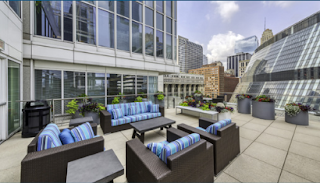James Patrick ("Jim") Crawley has announced his candidacy for Cook County Judge.
Admitted to practice in Illinois since 1990, according to ARDC, Crawley currently serves as litigation counsel for a transit division of the Regional Transportation Authority handling a wide range of cases.
Prior to attending St. Louis University Law School, Crawley served as an aide to former Illinois U.S. Senator Paul Simon. In law school, he worked in a clinic providing free legal services to the homeless, and as a law clerk for the Federal Public Defender. Crawley was a member of the editorial staff of the St. Louis University Public Law Review, a publication focused on public interest law.
Crawley served as an intern to the Honorable Myron H. Bright, Justice for the U.S. Court of Appeals for the Eighth Circuit. Also, while still in law school, Crawley served as a staff member of the first pro bono legal clinic in the nation to provide free legal services to people with HIV/AIDS at the height of the AIDS crisis. He was among the team of attorneys and law students who litigated the federal landmark case of Weaver v. Reagan, 886 F.2d 194 (8th Cir. 1989), a ruling that held that the state could not deny Medicaid coverage of the drug AZT to AIDS patients who were eligible for Medicaid and whose physicians had certified that AZT was medically necessary treatment. That landmark ruling continues to serve as legal precedent that the state must prove a rational basis to deny terminally ill individuals with available life-prolonging treatment.
Crawley returned to Chicago following law school and has served as an attorney in both public and private practice handling complex litigation in both state and federal courts. In addition to being licensed in Illinois, Crawley is a member of the General and Trial bars for the U.S. District Court for the Northern and Central Districts of Illinois, and the U.S. Court of Appeals for the Seventh Circuit. In 2005, he was sworn-in by Chief Justice John Roberts to practice before the U.S. Supreme Court. Crawley is a member of numerous bar associations, including the Chicago Bar Association, the Lesbian and Gay Bar Association, the Decalogue Society of Lawyers, the Chicago Council of Lawyers, and the Women’s Bar Association of Illinois.
Throughout his career, Jim has continued to work for his community and those in need. He served on the board of directors for Jane Addams Hull House and AIDS Care, the first residential home in Chicago for persons living with AIDS. For several years, Jim served on the Citizens Advisory Committee to the Chicago Police Department to facilitate community policing and open channels for dialogue between citizens and the police department.
Crawley was appointed by the Illinois Supreme Court to serve two terms on the Supreme Court Committee for Judicial Performance. He also served on the Commission for Access to Justice subcommittee charged with creating uniform forms for use by unrepresented litigants to ensure that the court system serves all persons, not only those that can afford an attorney. He has twice served as mentor to new attorneys under the Supreme Court’s attorney mentoring program. Crawley's commitment to the bar includes serving as a peer counselor to other attorneys under the court’s Lawyers Assistance Program. In addition to his current practice, Jim serves as court-appointed arbitrator in the Law Division of the Circuit Court of Cook County and is assigned both commercial and tort cases. Earlier this year, Jim received mediator certification through Northwestern University’s internationally recognized mediator training program.
This is Crawley’s third attempt at being elected judge; he ran countywide in 2014 and 2020. In the 2016 election cycle, Crawley sought slating for a 10th Subcircuit vacancy, but did not appear on the ballot.
As a member of the LGBTQ community, Crawley notes that his serving as a judge would bring diversity to the bench and help ensure that the make-up of the judiciary reflects the people it serves. He resides in Jefferson Park on Chicago’s northwest side with his spouse of 22-years, and their two dogs, Max and Harry.
Happy Groundhog's Day for those of you who celebrate
-
Punxsutawney Phil has predicted six more weeks of winter. Woodstock Willie,
on the other hand, is predicting an early spring. The on-and-off snow
flurries...
3 weeks ago
















